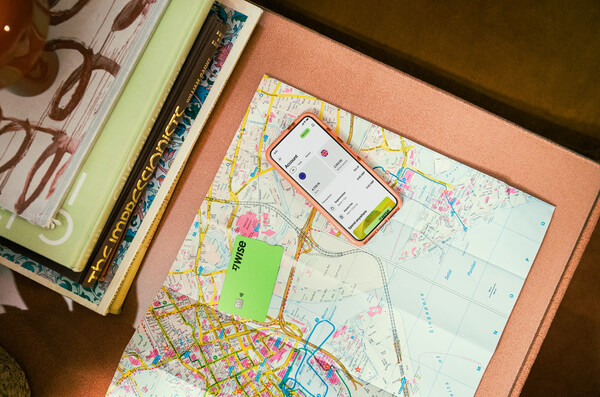
Is tap water in Poland safe to drink? A traveller's guide
This is intended to serve as a general guide. Always check with official sources for the latest government and health advice.
Opting for tap water is often the most eco-friendly and cost-effective way to stay hydrated while traveling. But when you're in a new country, knowing if the tap water is safe is crucial to avoid any unexpected health risks. If you're headed to Poland, you're likely wondering: is its tap water safe to drink?
The quick answer is yes. This guide will clearly explain why Poland’s tap water is safe, and detail its quality to help you prepare for your trip. We’ll also introduce the Wise card, a useful travel companion to help you save on spending during your time there.
| Table of contents |
|---|
Is tap water safe to drink in Poland?
Yes, tap water in Poland is generally safe to drink directly from the tap, particularly in urban areas according to the Chief Sanitary Inspectorate.1 Its quality is governed by the Regulation of the Minister of Health on the quality of water intended for human consumption (Rozporządzenie Ministra Zdrowia),1 which directly transposes the EU Drinking Water Directive into national law.
While some residents may still choose bottled water or filters, this is typically for personal taste or preference rather than a concern about safety. As a practical tip, always check if your specific tap is safe for drinking. Although the public water supply is reliable, older building plumbing or other disruptions could affect the water quality.
Understanding Poland's water quality
The primary official government authorities responsible for tap water quality and regulation include the Ministry of Health (Ministerstwo Zdrowia) and the Chief Sanitary Inspectorate (GIS).1,2They oversee the implementation of the national regulations, which set specific, enforceable standards for a wide range of parameters. Local entities, such as municipal water and sewage companies (e.g., MPWiK in Warsaw) and local sanitary inspection units, are responsible for daily operations, monitoring, and enforcement of water supply projects.2,3
Sources of Poland's tap water
Poland's tap water supply is primarily sourced from groundwater, which accounts for the majority of the supply, with surface water from rivers and reservoirs also contributing.4 The dominance of groundwater is a significant factor in the overall quality, as this water is naturally filtered by geological layers and often requires less intensive treatment than surface water.
The water undergoes treatment processes that typically involve filtration and disinfection, with a UV disinfection system.⁵ This process is supported by a rigorous monitoring regime, with frequent daily checks for key parameters to ensure compliance with quality standards.5
Mineral content and taste of Poland's tap water
The mineral content and hardness of Poland’s tap water vary regionally due to local geology. Water is generally moderately hard to hard in central and southern Poland, while softer water is more common in northern regions.6 The taste is typically neutral, though a slight chlorine taste may sometimes be noticeable in urban areas; this is a normal public health measure to maintain microbiological safety as water travels through the distribution network.
Heading to Poland? Maximise your PLN spending with the Wise Card
Staying hydrated is key to a great trip, and so is managing your travel budget wisely in Poland. The Wise card is a simple way to save when you're spending internationally, be it on bottled water, food or shopping. You can spend in 150+ countries, including Poland, at mid-market rate — basically the rate you see on Google. With no foreign transaction fees and low, transparent pricing, Wise usually gives you the best value for your money.

Simply create a Wise account for free, order a card and top-up to get started. Having a physical Wise card allows you to make chip and pin payments, as well as make some free ATM withdrawals each month for when you're in Poland. You can get digital cards and add to your Google or Apple Pay wallet for instant use. Spend directly with the Wise account and let auto-conversion do the trick or convert in advance to PLN. You can hold and exchange 40+ currencies in your Wise account and spend the currencies you hold for free.
Wherever your travel takes you, the Wise card makes spending money abroad cheaper and easier.
This general advice does not take into account your objectives, financial circumstances or needs and you should consider if it is appropriate for you.
Please see Terms of Use and product availability for your region or visit Wise Fees & Pricing for the most up to date pricing and fee information.
FAQs
Do I need to boil tap water in Poland to make it safe?
No, boiling tap water in Poland is not necessary for the public water supply, as it is generally safe to drink directly from the tap and meets strict quality standards.¹
How does the taste and quality of tap water differ within Poland?
The taste and quality of water can vary by region due to different water sources and mineral content. Water is typically harder in central and southern regions and softer in the north, which can influence its mineral taste.6
Is the ice served in restaurants and bars in Poland safe to consume?
Yes, the ice served in restaurants and bars is generally safe to consume, as it is made from the public water supply that is deemed safe to drink.1
Why do some people in Poland use water filters if the tap water is safe?
Some people in Poland use water filters primarily for personal taste preference, such as to remove a faint chlorine taste, or due to concerns about the quality of older pipes in their buildings.
Sources:
- Polish Government: Drinking Water
- Polish Government: Water Quality Report 2020-2022
- Warszawska Kranówka: Water Quality
- Water News Europe: Polish Water Sector Profile
- Krakow Convention Bureau: Drink Tap Water in Krakow
- Wodociągi Miasta Krakowa: What is My Water Like
*Please see terms of use and product availability for your region or visit Wise fees and pricing for the most up to date pricing and fee information.
This publication is provided for general information purposes and does not constitute legal, tax or other professional advice from Wise Payments Limited or its subsidiaries and its affiliates, and it is not intended as a substitute for obtaining advice from a financial advisor or any other professional.
We make no representations, warranties or guarantees, whether expressed or implied, that the content in the publication is accurate, complete or up to date.


